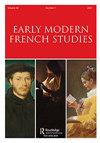简介:o男人准备好并迅速奴役
IF 0.1
3区 历史学
Q2 HISTORY
引用次数: 0
摘要
在这里,一位专制、憎恨自由的统治者轻蔑地谴责罗马元老院的谄媚,尽管罗马元老院是由自由出生的公民组成的,但它在他面前却自惭形秽。这句话在16世纪末的法国政治文学中被引用为对当前情况的类比,后来拉辛也提到了这句话。它的受欢迎程度表明,在现代早期的法国历史、政治和文学传统中,自由和奴役问题一直是争论的话题。他们在法国宗教战争(1562-1998)中以特别敏锐的眼光脱颖而出,当时暴政和本文章由计算机程序翻译,如有差异,请以英文原文为准。
Introduction: O hommes disposez & prompts à la servitude
Here a despotic, freedom-hating ruler contemptuously castigates the obsequiousness of the Roman Senate, which abases itself before him despite being composed of free-born citizens. The quotation was invoked as a parallel for current circumstances in late sixteenth-century French political literature and was later alluded to by Racine. Its very popularity is an index of the extent to which in early modern French historical, political, and literary traditions, questions of freedom and servitude remained perennial topics of debate. They came to the fore with particular acuity during the French Wars of Religion (1562–98) when tyranny and
求助全文
通过发布文献求助,成功后即可免费获取论文全文。
去求助
来源期刊

Early Modern French Studies
Multiple-
CiteScore
0.10
自引率
0.00%
发文量
14
期刊介绍:
Early Modern French Studies (formerly Seventeenth-Century French Studies) publishes high-quality, peer-reviewed, original articles in English and French on a broad range of literary, cultural, methodological, and theoretical topics relating to the study of early modern France. The journal has expanded its historical scope and now covers work on the sixteenth, seventeenth, and eighteenth centuries. Within this period of French literary and cultural history, the journal particularly welcomes work that relates to the term ''early modern'', as well as work that interrogates it. It continues to publish special issues devoted to particular topics (such as the highly successful 2014 special issue on the cultural history of fans) as well as individual submissions.
 求助内容:
求助内容: 应助结果提醒方式:
应助结果提醒方式:


